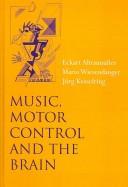| Listing 1 - 5 of 5 |
Sort by
|
Book
ISBN: 9780444635518 0444635513 Year: 2015 Publisher: Amsterdam Elsevier
Abstract | Keywords | Export | Availability | Bookmark
 Loading...
Loading...Choose an application
- Reference Manager
- EndNote
- RefWorks (Direct export to RefWorks)
Did you ever ask whether music makes people smart, why a Parkinson patient's gait is improved with marching tunes, and whether Robert Schumann was suffering from schizophrenia or Alzheimer's disease? This broad but comprehensive book deals with history and new discoveries about music and the brain. It provides a multi-disciplinary overview on music processing, its effects on brain plasticity, and the healing power of music in neurological and psychiatric disorders. In this context, the disorders the plagued famous musicians and how they affected both performance and composition are critically.
681 --- Music Psychological aspects --- Music Physiological aspects --- Musical perception --- Neurosciences --- Naslagwerken muziektherapie --- Nervous system --- Mental illness. --- Music therapy. --- Music --- Brain --- Mental Disorders. --- Musical perception. --- Neurosciences. --- Diseases. --- Psychology. --- Physiology. --- Physiological aspects. --- Psychological aspects.

ISBN: 0199298726 9780199298723 0198530005 9780198530008 Year: 2006 Publisher: Oxford Oxford University Press
Abstract | Keywords | Export | Availability | Bookmark
 Loading...
Loading...Choose an application
- Reference Manager
- EndNote
- RefWorks (Direct export to RefWorks)
The motor actions that can be witnessed as a virtuoso musician performs can be so fast, so accomplished, so precise, as to seem somehow superhuman. The musician has to produce the movements, monitor those they have already made and the subsequent result, co-ordinate their hands, fingers, eyes, and perhaps throat and diaphragm. These achievements are of course the product of hundreds, even thousands of hours of practice-playing scales, studies, time and time again. But those hours of practice by no means guarantee that great musicianship will result. This technical prowess has to be combined with a range of other, perhaps, less tangible qualities. This book explores the secrets of musical virtuosity. It presents a comprehensive account of music and motor cognition, examining the neural basis of music making - our understanding of which is just starting to be enhanced by brain imaging. It considers the effect on our brains of prolonged music making. It explores the motor processes across a range of instruments (vocal, string, wind, percussion) and within different performance situations. It also considers what happens when things start to go wrong - why motor problems occur in so many professional musicians in later life, and the possible therapies for such problems. Music is a topic of considerable interest within the brain sciences. With contributions from leading psychologists, neuroscientists, and neurologists, this book makes a unique contribution to our understanding of music and the brain.
Music --- Sensorimotor integration. --- Motor Activity --- Music. --- Brain --- Psychomotor Performance. --- Physiological aspects. --- Psychological aspects. --- physiology. --- Musique --- Intégration sensorimotrice --- Aspect physiologique --- Aspect psychologique --- Motor activity --- Intégration sensorimotrice --- Sensorimotor integration --- Integration, Sensorimotor --- Intersensory integration --- Perceptual-motor integration --- Sensimotor integration --- Sensory integration --- Sensory-motor integration --- Music psychology --- Music physiology --- Physiological aspects of music --- Physiological aspects --- Psychological aspects --- Psychology --- Perceptual-motor processes --- Sensory integration dysfunction
Book
Year: 1997 Publisher: Narberth (Pa.) : Gordon institute for music learning,
Abstract | Keywords | Export | Availability | Bookmark
 Loading...
Loading...Choose an application
- Reference Manager
- EndNote
- RefWorks (Direct export to RefWorks)
Book
ISBN: 9780444633996 0444633995 Year: 2015 Publisher: Amsterdam : Elsevier,
Abstract | Keywords | Export | Availability | Bookmark
 Loading...
Loading...Choose an application
- Reference Manager
- EndNote
- RefWorks (Direct export to RefWorks)
Brain --- Music --- Musical perception. --- Neurology --- Neurosciences --- Neurosciences. --- Physiology. --- History. --- Physiological aspects. --- Psychological aspects. --- Psychology.
Book
ISBN: 0191644897 0191506249 1299753418 9780191644894 0191747483 9780191747489 9780199583560 0199583560 Year: 2013 Publisher: Oxford Oxford University Press
Abstract | Keywords | Export | Availability | Bookmark
 Loading...
Loading...Choose an application
- Reference Manager
- EndNote
- RefWorks (Direct export to RefWorks)
Why do we think that we can understand animal voices - such as the aggressive barking of a pet dog, and the longing meows of the family cat? Why do we think of deep voices as dominant and high voices as submissive. Are there universal principles governing our own communication system? Can we even see how close animals are related to us by constructing an evolutionary tree based on similarities and dissimilarities in acoustic signaling?Research on the role of emotions in acoustic communication and its evolution has often been neglected, despite its obvious role in our daily life. When we infect
Interpersonal communication. --- Animal communication. --- Language and emotions. --- Emotive (Linguistics) --- Affective neuroscience.
| Listing 1 - 5 of 5 |
Sort by
|

 Search
Search Feedback
Feedback About UniCat
About UniCat  Help
Help News
News